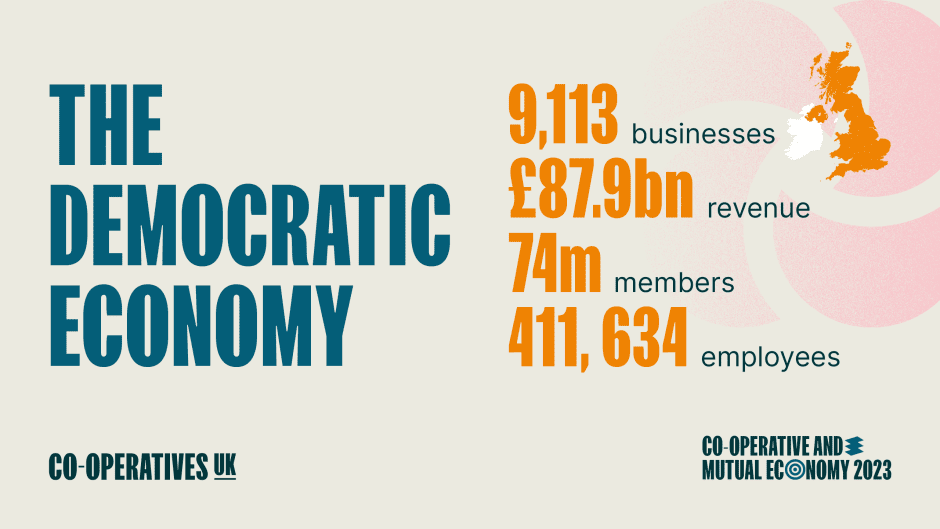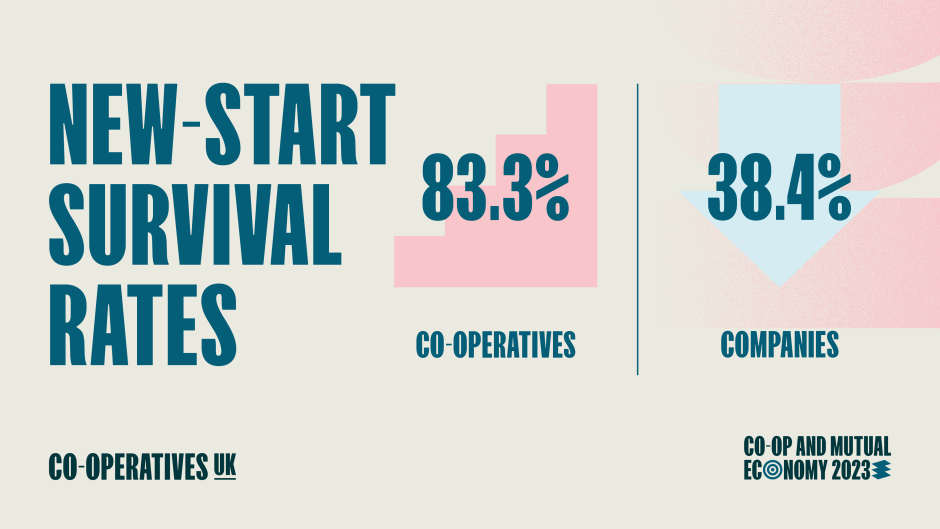The growth of the democratic economy over the past year – especially notable in the area of employee ownership – has been tracked in the Co-operative and Mutual Economy 2023 report.
The Co-operatives UK study maps the full democratic economy, comprising 9,113 entities including co-ops, employee-owned businesses, mutuals and building societies.
Co-ops, making up 83.2% of the democratic economy, have grown from 14 million members and a combined turnover of £39.4bn in 2022 to 14.3 million members and a combined turnover of £40.9bn in 2023. The number of independent co-ops in the UK rose 1.1% to 7,586 (contrasted with the number of businesses in general, which fell by 1.7% in the same period).
But it is the employee-owned sector, which makes up 15.6% of the democratic economy, that has grown the most. The number of employee-owned businesses has risen from 1,030 in 2022 to 1,418 this year, marking a 37.7% jump. The top 50 employee-owned businesses increased their combined income by more than 7.1% from £21.6bn in 2022 to £23.1bn this year.
Though financial mutuals and building societies account for just 3.2% of democratic businesses, they represent 80.7% of the democratic economy’s 74 million members.

The report highlights a recent move by Nationwide, the country’s largest member-owned organisation, to distribute wealth among members via its Fairer Share scheme, which returned £340m in £100 payments to eligible members, and its Fairer Share bond with a 4.75% interest rate.
Key growth areas include community pubs, which have grown 62.6% in the past five years, and energy and environmental sector co-ops, which grew 18.8% in the same timeframe.
The total democratic economy has an annual turnover of £87.9bn – which, the report warns, is small by international comparisons and only growing slowly.
It also calls for more practical support from the government, pointing to results in Scotland and Wales where more support is provided than Northern Ireland and England. A supportive legal and tax ecosystem is also crucial, with the report citing the recent growth of employee ownership trust model as an example of this.
Related: EO tax benefits must be extended to worker co-ops, government urged
“Government policy can unleash co-operative and mutual potential,” says the report, adding that the UK’s leading co-ops have backed its Call for Co-op Growth, which urges all parties to commit to growing the sector at the next election.
The report concludes that the mutual economy has “huge, untapped potential” and highlights the need to “inspire communities to take ownership and control of the economy; to empower young people; and to reach businesses and people at critical junctures – with the right support – to help them adopt democratic models”.

Co-operatives UK CEO Rose Marley said: “This report demonstrates the resilience, growth and power of co-operation. Ahead of the political party conference season, I urge all parties to move away from business as usual and embrace those democratic business models that are giving people real power, control and a stake in the future.”
Case study: Equal Care Co-op
Equal Care Co-op in West Yorkshire’s Calder Valley is the UK’s first platform-based social care and support co-operative.
Owned by its members, who can be supporters, workers, investors or advocates, Equal Care was set up in response to a problem with power in social care, says co-founder Emma back.
“Fundamentally, at the heart of social care there is a relationship that has been ignored, exploited and venture capitalised. We set out to rebalance the power dynamic in favour of the people who are getting and people who are giving support. It’s about relationships.”
Equal Care’s online platform enables those receiving support to build and manage their own team. This can consist of family members, paid care workers, volunteers, neighbours and friends. The co-op focuses on an equal relationship between those giving and receiving care, as well as meaningful, resilient and consistent care-giving relationships.
Michele Rashman, who began using Equal Care after being dissatisfied with the council-funded support provided to her mother, said: “With Equal Care we have this team of three or four people and I know who is coming and what time they’re coming. And I know loads about them. I like the continuity of care and a system where the care workers aren’t being exploited.”
Equal Care is a Real Living Wage employer, while self-employed workers can charge a higher hourly rate to cover the costs of self-employment. Workers are also paid for travel time.
Henry Drumm, 26, described working for the co-op as a “more fulfilling and a more genuine way of delivering care.”
Speaking about the core principle of the co-op, Drumm added: “The relationship between people is most important at Equal Care. It’s people-centred care; a relationship-centred service that’s much more holistic. It’s more meaningful.”
Case study: Grimsby Community Energy
Grimsby Community Energy (GCE) has been running since 2016, and now has 73 members and six solar installations totalling 200kW on local properties including community organisations.
Its solar panels have saved 143 tonnes of emissions, equating to tens of thousands of pounds in energy savings for the charities and social enterprises involved.
Funding for installation is raised through community share offers, while GCE sells the cheaper, cleaner energy to the building’s owners and offers a return to investors.
Sites include YMCA Humber and a charity shop for the Rock Foundation, which supports children and adults with learning disabilities.
GCE has also been working with North East Lincolnshire Council and local social enterprise E-Factor on the Smarter Energy NEL project since January. The project offers comprehensive energy audits to businesses and advises on how best to reduce carbon footprint and save money.
“Smarter Energy NEL has provided free energy audits to more than 40 businesses of all kinds, from a coffee shop to a foundry. In many cases, the audits have been followed by grants for energy saving measures, which will save more than 70 tonnes of CO2,” says GCE’s community energy manager Vicky Dunn.
“The aims are to help small and medium-sized enterprises make a real difference to their carbon footprint and positively reduce energy costs.”
Despite an 18.8% increase in co-ops operating in the energy and environment sector over the past five years, Dunn says community energy is under-utilised in England.
“The recent £10m government funding to help co-ops develop projects is welcome,” she adds. “However, in Wales and Scotland there are currently big targets to encourage a degree of community ownership in the development of big, commercial clean energy projects. There is no such target in England.
“Community energy can connect people with the big issues and give them experience of controlling and being involved in something that presents a solution. It has helped people gain a greater understanding of what climate change actually is – and what solutions look like.”